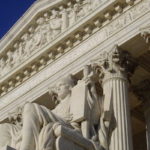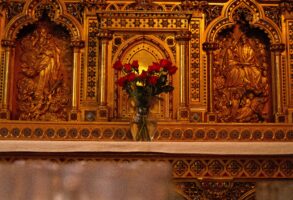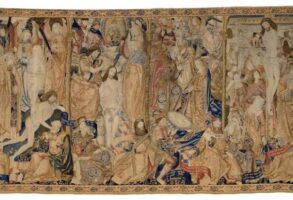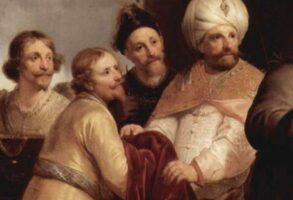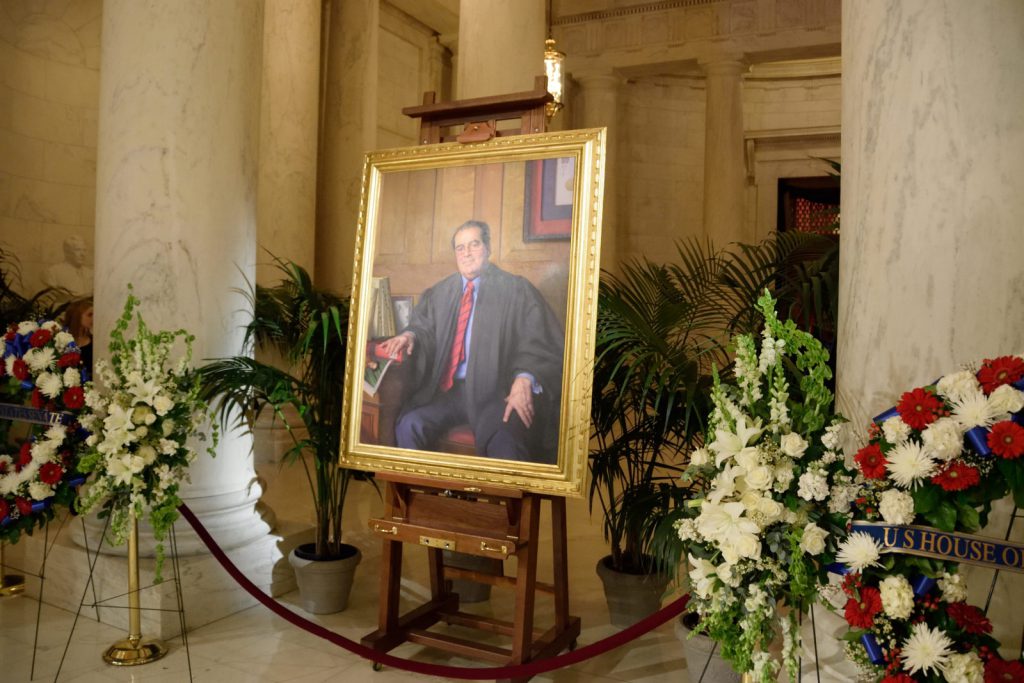
Published October 27, 2016
EDITORS’ NOTE: On October 26, the Catholic Information Center in Washington, D.C., posthumously honored Supreme Court justice Antonin Scalia with its John Paul II New Evangelization Award. Below is the prepared text of remarks that Mr. Whelan delivered at the award dinner.
I am deeply grateful for this opportunity to pay homage to a great and good man, a man to whom I owe so much, a man to whom we all owe so much, Justice Antonin Scalia. I would like to reflect on why we honor him this evening. And I want to let you hear more from him than from me, so I will draw extensively from his own words, including from two of his unpublished speeches.
A few years ago, Justice Scalia returned to his alma mater, Xavier High School in Manhattan, to speak at the awards ceremony for the school’s Junior ROTC Regiment. He fondly recalled that he had been a member of the Regiment some six decades earlier. After recounting the Regiment’s rich history, Justice Scalia praised the “high vocation” of military service. The “defining virtue of a soldier,” he observed, “is courage.” Indeed, he said, quoting C. S. Lewis’s insightful demon Screwtape, “courage is not simply one of the virtues, but the form of every virtue at the testing point, . . . at the point of highest reality.”
Justice Scalia emphasized a fundamental Christian “lesson — that our choices really matter, and that everything depends on them.” That lesson, he went on, is
in some ways easier for the soldier to remember when life hangs in the balance. It is harder in the layman’s endless days of peace, where moral courage rarely requires the sacrifice of one’s life. But for most of us, that is the long fight we are in for — putting things right in the world God has created, starting with ourselves. . . . By teaching physical courage in service of others, [the Regiment] teaches moral courage — which, in the Last Accounting we must give, is the kind that matters.
Those of us who had the privilege of knowing Justice Scalia know him as an exemplar of moral courage, a man who strove to put things right, who wouldn’t be lured away or cowed from doing his duty. We have ample cause to be confident that in the Last Accounting that he has now given, he has earned high marks for moral courage. And we know that his courage intensified his many other virtues.
Antonin Scalia was a great Supreme Court justice, a brilliant expositor of the Constitution, and a scintillating writer. As Catholics, we have particular reason to be grateful for his deep fidelity to the Constitution. Pope St. John Paul II called on Catholics, and on all men and women of goodwill, to build up an authentic culture of life. The actual American Constitution — the one that Justice Scalia propounded but that has been in critical respects overridden — gives American citizens the freedom to enact laws and implement policies that help build that culture of life.
Justice Scalia vigorously exposed the lie, first propagated in Roe v. Wade and then perpetuated in Planned Parenthood v. Casey, that the Constitution somehow denies American citizens the authority to protect the lives of unborn human beings.
He recognized the authority of government to understand marriage — our central social institution — as the union of a man and a woman, just as it had been from the founding of this country.
He fought the secularist myth that the Establishment Clause requires the exclusion of religion from the public square and that it justifies discrimination against religious believers. Instead, he explained, “Those who wrote the Constitution believed that morality was essential to the well-being of society and that encouragement of religion was the best way to foster morality.” When a five-justice majority ruled that the Establishment Clause prohibits even nonsectarian invocations at public-school graduation ceremonies, Justice Scalia observed in dissent that religion is not,
as the [majority] apparently thinks it to be, some purely personal avocation that can be indulged entirely in secret, like pornography, in the privacy of one’s room. For most believers it is not that, and has never been. Religious men and women of almost all denominations have felt it necessary to acknowledge and beseech the blessing of God as a people, and not just as individuals, because they believe in the “protection of divine Providence,” as the Declaration of Independence put it, not just for individuals but for societies; because they believe God to be, as Washington’s first Thanksgiving Proclamation put it, the “Great Lord and Ruler of Nations.” One can believe in the effectiveness of such public worship, or one can deprecate and deride it. But the longstanding American tradition of prayer at official ceremonies displays with unmistakable clarity that the Establishment Clause does not forbid the government to accommodate it.
Justice Scalia, I hasten to add, would dismiss the idea that he deserves any special thanks for his positions on these issues. As a matter of constitutional law, these questions were easy, he would say, and he was just doing his duty of interpreting the Constitution impartially. All true. But how tempting it is for all of us to find excuses not to do our simple duties. And how much better things would be — in our own lives, in our families, in our workplaces, in our country, in the Church — if everyone worked to get the simple things right.
In Christifideles Laici, John Paul II emphasized the duty of the lay faithful to sanctify the world “by fulfilling their own particular duties.” By faithfully and courageously living out his professional vocation in the secular world, Justice Scalia provided a powerful example for the rest of us. That is one of the reasons we honor him this evening.
It is important to clarify, though, that we do not honor Justice Scalia for supposedly being a “Catholic justice.” If that label means nothing more than a justice who is Catholic, then it is of course unobjectionable. But in an odd convergence, some of the Justice’s fiercest detractors and some of his ardent, if inattentive, admirers have used the label to suggest that there is a distinctively Catholic way of being a Supreme Court justice, or to allege that Justice Scalia indulged his Catholic convictions in deciding cases. Understood that way, the label of “Catholic justice” is something that Justice Scalia emphatically rejected. As he put it: “I don’t think there’s any such thing as a Catholic judge. There are good judges and bad judges. The only article of faith that plays any part in my judging is the commandment, Thou Shalt Not Lie.” Thou shalt not lie, that is, about the meaning of the Constitution or of the other laws that the Supreme Court is applying.
In his secular vocation as a Supreme Court justice, Justice Scalia recognized that the system of separated powers that our Constitution creates limits federal judges to interpreting legal text and bars them from refashioning that text according to their own preferences. A good judge, of whatever religious faith or of no faith at all, is adept at determining the meaning of legal text and is committed to applying that meaning impartially. A judge who is Catholic has no more authority to misread a law to reach a supposedly Catholic result than a banker who is Catholic has the authority to fleece his clients’ accounts in order to fund Catholic causes.
We especially honor Antonin Scalia this evening for his broader life of public witness, beyond his circumscribed duties in deciding cases as a Supreme Court justice. Just as public scandal, as the Catechism instructs us, “takes on a particular gravity by reason of the authority of those who cause it,” so the faithful Catholic witness of those prominent in public life has a special force.
As John Paul II observed, “The ministry of evangelization carried out by Christian parents is original and irreplaceable.” We celebrate Justice Scalia for his 55 years of devoted marriage to his wonderful wife. And we take delight in the visible fruits of that marriage: Their nine remarkable children — one priest, four husbands and fathers, four wives and mothers. Their 36 grandchildren born so far — with, I’m told, numbers 37 and 38 to make their appearances soon. And, yes, the first of their — by my estimate — some 100 to 200 great-grandchildren will be born this December.
As a jurist, Antonin Scalia was an apostle of textualism. As a man, he was a disciple of the Word. By his example and quiet counsel, he encouraged those of us who knew him to embrace our faith more deeply and to strive to live our own lives of moral courage and integrity. I recall from my clerkship days one Holy Day of Obligation on which the Boss, as we called him, detected that I was buried in work and hadn’t yet gone to Mass. He gave a gentle nudge by quoting the Gospel passage, “What will it profit a man if he gains the whole world, but loses his soul?”
Justice Scalia inspired countless individuals who never met him: Witness the lines of thousands of mourners who waited for hours in cold weather to pay their respects as his body lay in repose at the Supreme Court.
Justice Scalia generously shared his faith in many other ways, including by accepting speaking invitations from Catholic and Christian groups from around the country. He had a favorite speech for these occasions — one that I first heard him give in the early 1990s. He called it “The Two Thomases.”
The first Thomas in the speech is Thomas Jefferson, who spent a few of his quiet evenings as president, “razor in hand, . . . editing the Gospels” (quoting Jaroslav Pelikan) to eliminate what he confidently declared to be their “groundwork of vulgar ignorance, of things impossible, of superstitions, fanaticisms and fabrications.” The Jefferson Bible ends abruptly with the entombment of the crucified body of Jesus in a sepulcher. As Justice Scalia observed, in Jefferson’s eyes “everything from Easter morning to the Ascension had to have been made up by those [evangelist] rogues . . . , presumably part of their clever plan to get themselves crucified.”
Justice Scalia’s point, he emphasizes,
is not that reason and intellect must be laid aside where matters of religion are concerned. Assuredly not. . . . It is not irrational, however, to accept the testimony of eyewitnesses, who had nothing to gain by dissembling, about the resurrection of Jesus Christ, and about what Jesus taught them; or, for that matter, to accept the evidence of later miracles that establish the truth of the Church that Christ founded. What is irrational, it seems to me, is to reject a priori, with no investigation, the possibility of miracles in general, and of Jesus Christ’s resurrection in particular — which is, of course, precisely what the worldly wise do.
Justice Scalia’s second Thomas, as you might have guessed, is his great hero St. Thomas More. Along with the wedding picture of his bride, Justice Scalia’s Supreme Court portrait includes on his desk Hans Holbein’s famous depiction of St. Thomas More.
There’s obviously much that Thomas More and Antonin Scalia had in common. Both had great legal minds that carried them to the heights of governmental power. Both were noted for their wit and their capacity for friendship. Both were embroiled in controversies over the nature of marriage and religious liberty. Both were men of faith and of prayer.
But to really understand Justice Scalia’s special admiration for St. Thomas More, please indulge me as I read a long excerpt from his speech:
[Thomas] More was, of course, one of the great men of his age: lawyer, scholar, humanist, philosopher, statesman — a towering figure not just in his own country of England but throughout Renaissance Europe. You will have missed the deep significance of More’s martyrdom — and you will not understand why More is a particularly apt patron saint for lawyers, scholars, and intellectuals — unless you appreciate that the reason he died was, in the view of almost everyone at the time, a silly one. Many martyrs have died for refusing to deny Jesus Christ, or for spreading his Gospel, or for adhering to his clear moral teachings. In going to their death, they have had the comfort of knowing that their Christian predecessors, contemporaries, and successors would praise and approve their obstinacy. Thomas More, on the other hand, went to his death to support the proposition that only the Pope of Rome could bind or loose the marriage of Henry VIII. A papacy corrupt and politicized. A papacy that often granted or withheld divorce for reasons of diplomacy rather than doctrine — which may well have been the case with regard to the denial of Henry’s divorce. More knew all that. More himself, like his humanist contemporaries such as Erasmus, had been a harsh critic of Rome. . . .
In what he did, More was unsupported by intelligent society, by his friends, even by his own wife. Robert Bolt’s play, A Man for All Seasons, puts that point nicely. When More learns that the Convocation of Bishops has voted unanimously (except for John Fisher of Rochester) to adhere to the King’s demands that they acknowledge his divorce despite the Pope, More decides that he must resign the chancellorship, and asks his wife Alice to help him remove his chain of office. She says: “Sun and moon, Master More, you’re taken for a wise man! Is this wisdom — to betray your ability, abandon practice, forget your station and your duty to your kin and behave like a printed book!” And later along the road, his friend the Duke of Norfolk says: “You’re behaving like a fool. You’re behaving like a crank. You’re not behaving like a gentleman.” “[I]t’s disproportionate! . . . [W]e’ve all given in! Why must you stand out?” . . .
But of course More was not seeing with the eyes of men, but with the eyes of faith. He believed Christ’s word that Peter was the Rock, and the Christian tradition that the Pope was the head of the Church. As low as the papacy had declined . . . the Vicar of Christ alone — and not all the bishops of England — had the power to bind and to loose. I find it hard to understand the reasoning of those wise people who revere Thomas More as a saint rather than a world-class fool for dying to support the decision of Medici Pope Clement VII concerning King Henry’s divorce of Catherine of Aragon, but who themselves ignore and indeed positively oppose the teachings of Pope John Paul II on much more traditional and less politically charged subjects. Go figure.
It is the hope of most speakers to impart wisdom. It has been my hope to impart, to those already wise in Christ, the courage to have their wisdom regarded as stupidity. Are we thought to be fools? No doubt. But, as St. Paul wrote to the Corinthians, “[w]e are fools for Christ’s sake.” And are we thought to be “easily led” and childish? Well, Christ did constantly describe us as, of all things, his sheep, and said we would not get to heaven unless we became like little children. For the courage to suffer the contempt of the sophisticated world for these seeming failings of ours, we lawyers and intellectuals — who do not like to be regarded as unsophisticated — can have no greater model than . . . the great, intellectual, urbane, foolish, childish man that he was. St. Thomas More, pray for us.
John Paul II elegantly compared faith and reason to “two wings on which the human spirit rises to the contemplation of truth.” Antonin Scalia was a man of faith and reason. His spirit soared to great heights on this earth, and we hope and pray that it has now risen to eternal heights.
May we all be inspired by his example to live Catholic lives of integrity.
May we see not with the eyes of men but with the eyes of faith.
May we be wise in Christ.
And may we, too, have the courage to suffer the contempt of the sophisticated world.
— Ed Whelan, a former law clerk to Justice Scalia, is president of the Ethics and Public Policy Center and a regular contributor to NRO’s Bench Memos blog.





